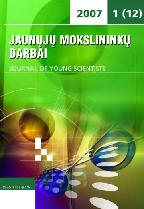Ankstyvosios intervencijos srities specialistų profesinės kompetencijos
Competences of Early Childhood Intervention Professionals
Author(s): Lina Kondrotienė, Stefanija AlišauskienėSubject(s): Social Sciences
Published by: VšĮ Šiaulių universiteto leidykla
Keywords: Early childhood intervention professional; professional training; competence.
Summary/Abstract: Taking into consideration the fact that early childhood intervention (ECI) professionals working in teams come from different fields and provide support to extremely vulnerable persons (e. g. young age children with developmental problems and their families), the requirements for professional competences are very high: professionals need to have not only specific knowledge and skills, but also common competences necessary for early childhood intervention. Professionals (special pedagogues, speech therapists, physiotherapists, etc.) working in ECI and kindergartens during their studies at university gain some competences necessary for ECI, they can develop complementary competences during in-service training courses or in practice, however, we lack an ECI professional training system. Much efforts has been put to provide professionals with relevant professional training in the field of ECI in Europe, but till now there is lack of standardised programs for professional training. The system of professional training for ECI in Lithuania has just started to be created, so the content of professional training of professionals working in the field can be analysed according to the documents (diploma, certificates, etc.) and professionals’ reflections. The aim of the survey presented in the article is to analyse what kind of competences ECI professionals gain at university bachelor and master study levels as well as in-service training courses. The methods used: content analysis of documents (data from certificates in an open-ended questionnaire, based on the online assessment instrument of Leonardo da Vinci project European Passport for Early Childhood Intervention Professionals/EBIFF). Participants: 25 professionals, special teachers, speech therapists, psychologists, physiotherapists, kindergarten teachers, working in early childhood intervention services and kindergartens, took part in the survey in January–February, 2008. The survey showed that in most clusters the content of professional training is related to the professional working area, but holistic knowledge is missing; the training content of speech therapists, special teachers and social workers is the widest and the most relevant to the curriculum of early childhood intervention professional training, conversely, nurses’, physiotherapists’ and their assistants’ training portfolio is quite constricted.
Journal: Jaunųjų mokslininkų darbai
- Issue Year: 2008
- Issue No: 2(18)
- Page Range: 24-34
- Page Count: 11
- Language: Lithuanian

